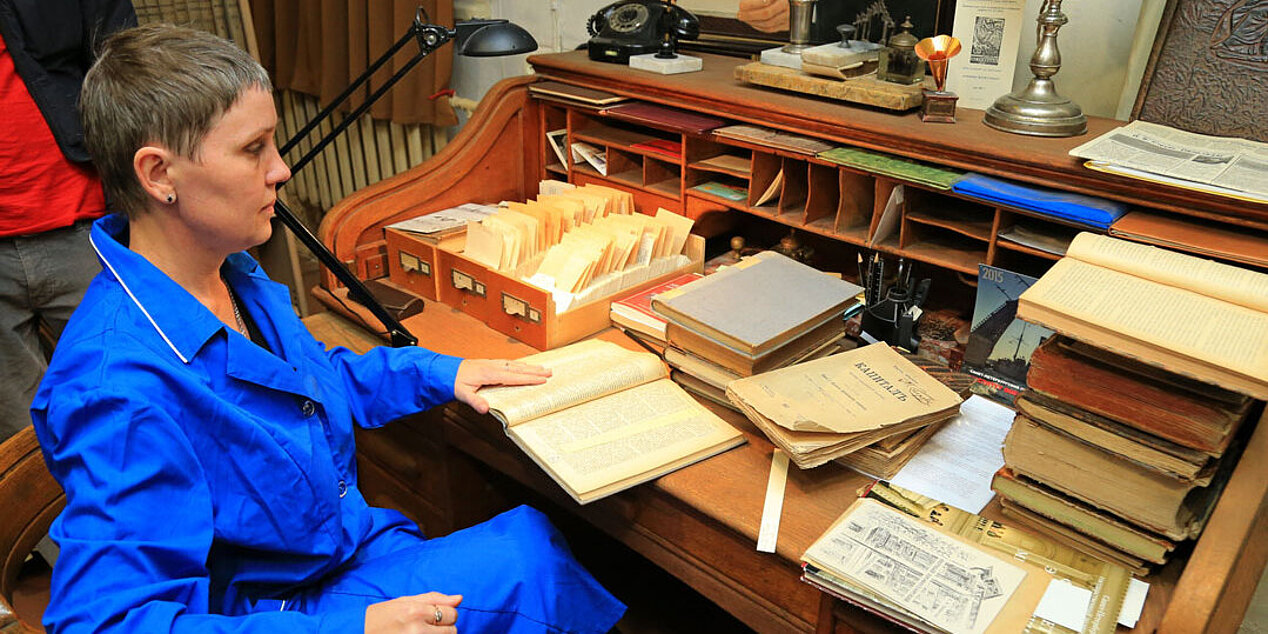According to Wladimir Lenin's telegram dated January 13, 1919 and addressed to Aleksey Kudriavtsev, Head of the Library Department of the People's Commissariat for Education, the private library of Peter Struve (1870-1944) should be 'saved from plundering' and passed on to the Peter the Great St. Petersburg Polytechnic University. From then until now the so-called 'Struve Collection', consisting of more than 9,000 works from the 17th until the early 20th century in Latin, Greek, German, English, French, Polish and Russian was placed in a storage room of the Polytechnic University, invisible to the eyes of researchers, only partly catalogued, and never examined systematically.
Struve's library – eye witness to the epoch
Peter Struve was an outstanding Russian political economist, philosopher, editor, literary scholar and writer. Being one of the first Marxists in Russia, he was regarded together with Lenin as a leader of the Marxist Party in the 1890s. The roads of both politicians diverged, and since 1902 Struve has become one of the most prominent figures of Russian liberalism. Struve's library seems to be an eye-witness to the epoch, bridging times and places, reflecting the interests of its owner, and revealing his wide circle of acquaintances, including Vladimir Lenin, Semen Frank, Nikolaj Berdjaev and Konstantin Nabokov.
A year prior to Struve's 150th anniversary, we learned about ifa's CCP Synergy Programme. We considered it an ideal opportunity to set in motion the joint initiative of the University of Konstanz and St. Petersburg Polytechnic University that is devoted to the personality of Struve and especially to his private library. The goal of the ongoing project is to establish a shared digital platform where the wide range of materials related to Struve can be collected and displayed.
Entering the creative laboratory
In September 2020, we were welcomed at the Polytechnic University by our project partners, Natalia Sokolova and Alexander Plemnek. They introduced us into the 'world' of Struve's activities at the Polytechnic University where he taught courses in political economy, industrial economics, and the history of economic thought between 1906 and 1917, until he emigrated. Struve was living in a so-called second professor's building on campus, taking part in meetings of the Big Council of the Polytechnic University in the Academic Council Room. With the attentive support of Nina Suratova, the custodian of Struve's collection and Director of the University's Library, we plunged into Struve's 'creative laboratory', which he obviously used while writing 'Khoziaistvo i tsena' (Enterprise and Price, 1913, 1916), editing the Russian translation of Marx' 'Capital' (1867) or working on his essay 'Intelligentsiia i revoliutsiia' (Intelligentsia and Revolution, 1909).
The most exciting experience during our research stay at Struve's library was to discover marks and autographs by leafing through the old volumes. Among other things, we discovered a dedication by Lily Braun, a German feminist writer and politician who was a member of the Social Democratic Party, on the flyleaf of her book, 'Die Frauenfrage' (The Women's Question, 1901).
We hope to welcome our partners from St. Petersburg at the University of Konstanz soon to discuss the plans for cooperation between the universities in detail and to visit the Hauptstaatsarchiv Stuttgart (one of the main state archives of Baden-Wuerttemberg) that stores documents from 'Osvobozhdenie' (Liberation), a political magazine edited by Struve from 1901-1902.
About the authors
Maria Zhukova is a Research Fellow at The Centre for Cultural Inquiry and an Associated Fellow at Zukunftskolleg at the University of Konstanz. She studied German literature at St. Petersburg State University and the universities of Münster and Vienna. Zhukova holds a PhD in German literature from the University of St. Petersburg. Her research interests include the representation of television in Soviet and Russian film and literature, media and memory, and transgenerational narratives.
Innokentij Urupin is lecturer in Russian studies at the University of Konstanz, freelance translator and journalist. His doctoral thesis, completed at the University of St. Petersburg, examined the prose-texts of Ingo Schulze with reference to his reception of Moscow Conceptualism. In his ensuing research, Urupin mediologically analysed poetics of Vladimir Nabokov, Viktor Shklovsky, Johannes Bobrowski as well as of Russian silent film.
About CCP Synergy
Civil society organisations from Germany and from a partner country of the CrossCulture Programme (CCP) are supported by the CCP Synergy programme to work together on a project and create a lasting network. Funding for short stays is provided to employees of the two cooperating organisations.

